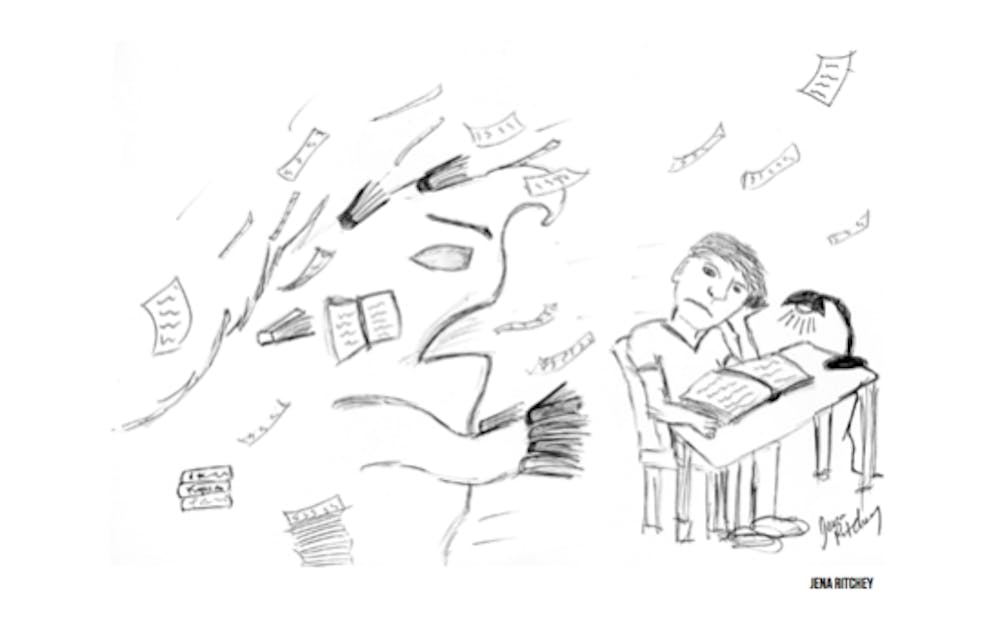In my short time here at Middlebury, I estimate that on average, I read about 400 pages a week for class. This guess takes into account those weeks when my professors assign shorter, but denser, academic papers, and those when a novel is completed every other day. Often, a seven-day period will require me to read upwards of 700 pages across several different books and articles. I willingly chose the literature/political science path, and so I accept this burden to an extent, but this experience is not exclusive to my situation. I cannot count the number of times I’ve heard students lament the fact that they have 300 plus pages to finish in one night. Listening to these woes and experiencing my own, I have realized that the line between necessary and excessive amounts of reading has not just been crossed, it has been blasted through. Although there must certainly be reasons for it, such a practice does not seem conducive to either effective learning or psychological health.
First and foremost, a barrage of reading renders it nearly impossible to fully comprehend the significance of any one piece. Each time we read, we receive information, process it and analyze it, determining the purpose of the author. This is the system of academics and research that is generally second-nature to students. But the fundamental point of class time is to apply the author’s purpose to general mechanisms that operate within the world. Through lectures and discussions we take our analysis of the reading and attempt to reconcile the arguments contained within with the forces that govern the events we observe. We learn that each author presents a different perspective with which to study these events. The problem with a heavy amount of reading, therefore, is that we receive an excess of viewpoints. Especially in classes that cover previously unknown subject matter, a student can go from having no framework with which to study the subject to having a dozen over the course of a couple weeks. Many of those perspectives compete with each other; some are outright contradictory. Since there is simply not enough class time in a college system, therefore, how can a student possibly be able to come to a meaningful conclusion about the subject matter? Sure, often there is some underlying structure that the class teaches, but stopping at this severely undermines the import of the readings. The full application of any one argument is infeasible when confronted with the deafening array of different viewpoints and an overall lack of sufficient time to discuss it.
Heavy reading also lessens the value of the material. Remember very much of those first assignments at the beginning of the semester? I’m sometimes hard-pressed to recall much of the content I read last week, let alone two months ago. I have consumed so many pages of information since the beginning of the year that very little ever stands out. Books quickly fade to echoes; general points are occasionally brought up but substance is pretty much left behind. If this is the case, then, why do we even need to read the entire book or article? Would it not be more efficient and effective to simply read a passage or two that summarize the main points and clearly state the impacts of those points? I strongly support reading the products of the great minds of history, but if the purpose of these classes is to cover as many perspectives and arguments as possible then it would seem better served by heavily abridged reading loads. That way, they will be less readily forgotten and will not be lost to the incessant waves of information and rhetoric.
Finally, however, this practice often harms the psychological health of students. Every time a massive assignment is completed, another one is there to take its place. Although obviously procrastination is a factor, 300-page nights are the products of unending piles of books and articles that must be read. It is extremely difficult to ever not have those nights, especially with two or three reading-intensive classes. As a result, it is easy to feel behind, because there is no way to ever feel that the work is complete for a while, with another 300 page assignment due the next day. In addition, for me at least, this practice negates my desire to read for fun. After so much reading, I find myself unable to pick up a novel for enjoyment. My ability to concentrate on a written story is entirely eliminated.
I believe that something needs to change. Ideally, more discussion would take the place of some of the readings. This would allow the significance of each article or book to be more fully explored, and it would better solidify the importance of each author’s arguments for the student. Classes would be able to investigate the application of arguments more completely, furthering the understanding of the subject matter as a whole. Finally, it would significantly reduce the strain on the students and would give a little room to breathe to those like me who want to read for fun again.
Artwork by JENA RITCHEY




